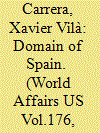| Srl | Item |
| 1 |
ID:
128400


|
|
|
|
|
| Publication |
2014.
|
| Summary/Abstract |
A specter is haunting Spain. It comes from a promise made on November 13, 2003, by José Luis Rodríguez Zapatero, then secretary general of Spain's Socialist Party and a candidate for prime minister of the country. "I will support any reform of the Catalan Statute of Autonomy approved by the Catalan Parliament," he told twenty thousand people gathered in Barcelona's Palau Sant Jordi, referring to the law that oversees the government of Catalonia. Then, to the delight of an astonished audience, he went on to recite, in Catalan, a verse by the beloved poet Miquel Martí i Pol. Zapatero's words resonated strongly among the left-wing establishment poised to make history in the Catalan election three days later.
|
|
|
|
|
|
|
|
|
|
|
|
|
|
|
|
| 2 |
ID:
152868


|
|
|
|
|
| Summary/Abstract |
This article analyzes the determinants of terrorism saliency in public opinion. It is usually assumed that after a terrorist attack, terrorism becomes automatically salient. However, this assumption is only true in those countries where terrorist attacks are exceptional events. In democracies that have suffered domestic terrorism for decades, the evolution of terrorism saliency does not only depend on the frequency or intensity of terrorist attacks. In this article it is claimed that the tactics carried out by terrorist groups (the type of victim, especially) and the dynamics of political competition (especially the ideology of the incumbent) are also factors that explain the evolution of terrorism saliency. The article also analyzes how these two factors interact with citizens’ predispositions to explain variation in their reactions to terrorist threat. The empirical test relies on a novel database from monthly public opinion surveys in Spain from 1993 to 2012.
|
|
|
|
|
|
|
|
|
|
|
|
|
|
|
|